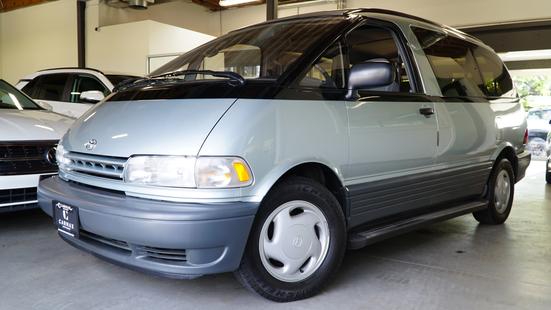The Toyota Previa, known for its unique design and spacious interior, is a minivan that has catered to families and travelers since its introduction. Positioned in a market segment dominated by practicality and reliability, the Previa has historically offered a blend of innovative design and Toyota's renowned dependability.
History and Background
The Toyota Previa first hit the market in the early 1990s, quickly distinguishing itself with its mid-engine layout and futuristic looks. This model was one of the first to integrate a more aerodynamic design into the minivan segment, setting it apart from boxier competitors of its time. Over the years, the Previa has seen several updates, each enhancing its design, technology, and engine efficiency while maintaining its core values of space and versatility.
Key Dates:
- 1990: Introduction of the Previa, featuring a mid-engine design.
- 1994: Introduction of the supercharged version for improved performance.
- 1997: Facelift and introduction of all-wheel drive options.
- 2000: Second generation launched with more conventional front-engine layout.
- 2005: Introduction of hybrid technology in certain markets.

1994 Toyota Previa
$18,800
71,159 miles
Performance and Handling
| Variant | Engine | Power | 0-60 | Top Speed | Fuel Economy |
|---|---|---|---|---|---|
| Base | 2.4L 4-cylinder | 138 hp | 12.5s | 105 mph | 19/24 mpg |
| SC | 2.4L Supercharged | 158 hp | 10.5s | 110 mph | 17/22 mpg |
| V6 | 3.5L V6 | 266 hp | 7.8s | 115 mph | 18/24 mpg |
Interior and Comfort
| Feature | Base | Mid | Top |
|---|---|---|---|
| Fabric seats | ✓ | ✓ | - |
| Leather seats | - | ✓ | ✓ |
| Sunroof | - | ✓ | ✓ |
| Navigation | - | ✓ | ✓ |
Technology and Features
Technology by Model Year:
- 1990: Introduction of dual-zone climate control
- 1994: Addition of electronic supercharger control
- 2000: Introduction of GPS navigation system
- 2005: Launch of hybrid engine option with regenerative braking
Infotainment System:
- Screen size: 6.1-inch touchscreen
- Features: Bluetooth, USB connectivity, CD player, AM/FM radio
- Connectivity: Bluetooth, USB, AUX input
Driver Assistance Features:
- Standard: Anti-lock brakes, traction control, rearview camera
- Optional: Parking sensors, blind-spot monitoring, adaptive cruise control
Safety
The Toyota Previa has consistently been regarded as a safe vehicle, with solid crash test results over its production years. Its robust build and array of safety features provide peace of mind for drivers and passengers alike.
Safety Ratings:
- NHTSA Rating: 4 stars
- IIHS Rating: Good
Safety Features:
- Standard: Airbags, anti-lock braking system (ABS), electronic stability control
- Optional: Lane departure warning, adaptive cruise control
Value for Money
| Year | Condition | Price Range |
|---|---|---|
| 2005 | Excellent | $7,000 - $9,000 |
| 2010 | Good | $5,000 - $7,000 |
| 2015 | Fair | $3,500 - $5,000 |
Running Costs:
Running costs for the Toyota Previa are generally affordable, with its engines known for their durability and efficiency. Routine maintenance is straightforward and parts are widely available, keeping costs in check.
- Fuel Economy: 19 city / 24 highway / 21 combined
- Service Intervals:
- Oil Change: Every 5,000 miles
- Major Service: Every 30,000 miles
- Common Repair Costs:
- Transmission rebuild: $1,500 - $2,000
- Timing belt replacement: $500 - $800
Known Issues by Year:
- 1994: Supercharger issues
- 2000: Transmission fluid leaks
Competitor Comparison
Competitor 1: Honda Odyssey
- Market Position: The Odyssey is a top competitor with a focus on family-friendly features and strong resale value.
- Features Comparison: Offers more advanced technology and entertainment options compared to older Previa models.
- Price Comparison: Generally priced higher than the Previa in the used market.
- Running Costs: Similar fuel economy but higher maintenance costs due to more complex electronics.
Competitor 2: Chrysler Pacifica
- Market Position: Known for its innovative features and hybrid variant, the Pacifica targets eco-conscious families.
- Features Comparison: Offers a more luxurious interior and an advanced infotainment system.
- Price Comparison: More expensive initially, but competitive in the used market.
- Running Costs: Higher due to more advanced technology and hybrid maintenance.
Competitor 3: Kia Sedona
- Market Position: The Sedona offers a budget-friendly alternative with a focus on value and practicality.
- Features Comparison: Similar interior quality but lacks some of the advanced driver aids found in newer Previa models.
- Price Comparison: Generally more affordable than the Previa.
- Running Costs: Lower due to simpler mechanical design and cheaper parts.
Verdict
The Toyota Previa remains a compelling choice for those prioritizing space, reliability, and practicality in a minivan. While it may lack the latest technology and features of its modern counterparts, it compensates with its proven track record for durability and an affordable price point in the used market. Ideal for budget-conscious families, the Previa continues to hold its own in the competitive minivan segment.